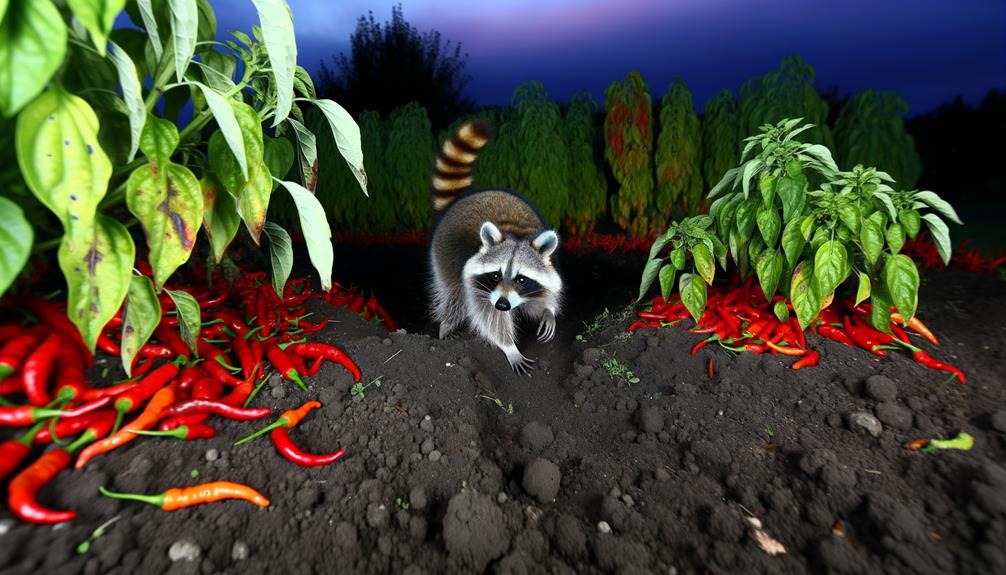Does Cayenne Pepper Keep Raccoons Away?
Cayenne pepper is effective in deterring raccoons due to its capsaicin content. Capsaicin interacts with the TRPV1 receptor in mammals, eliciting a burning sensation that raccoons find intolerable.
Homeowners typically report decreased raccoon activity after using cayenne pepper around entry points and gardens. Various application methods, such as sprinkling dry powder or preparing spray solutions, enhance its efficacy.
However, proper safety precautions must be observed to prevent irritation to humans and pets. For more detailed insights into this method and alternative deterrents, see the thorough breakdown provided.

Key Takeaways
- Cayenne pepper contains capsaicin, which irritates raccoons and deters them effectively.
- Homeowners report decreased raccoon activity after using cayenne pepper in garden areas.
- Capsaicin in cayenne pepper induces a burning sensation, discouraging raccoons from frequenting treated areas.
- Multiple application methods, such as powders and sprays, can be used to distribute cayenne pepper.
- Safety precautions are essential to prevent irritation to humans, pets, and the environment.
The Science Behind Cayenne Pepper
Cayenne pepper contains capsaicin, a bioactive compound that elicits a strong irritant response in mammals, particularly affecting pain receptors. Capsaicin interacts with the Transient Receptor Potential Vanilloid 1 (TRPV1) receptor, a nociceptor responsible for detecting noxious stimuli such as heat and physical abrasion.
Upon binding to TRPV1, capsaicin induces a sensation of burning pain, leading to avoidance behaviors in animals. This mechanism has been extensively studied, demonstrating its efficacy in deterring various mammals.
In the context of raccoons, which possess keen olfactory and gustatory sensitivities, capsaicin's irritant properties can disrupt foraging patterns, thereby reducing their presence in targeted areas. The compound's application serves as a humane, non-lethal method to manage wildlife encroachment effectively.
Anecdotal Evidence
Numerous anecdotal reports suggest that homeowners and gardeners have successfully deterred raccoons by sprinkling cayenne pepper around their properties. These informal accounts often describe a marked decrease in raccoon activity following the application of cayenne pepper, attributed to its pungent capsaicin content, which irritates the mucous membranes of these nocturnal foragers.
Though individual experiences vary, the consensus within these narratives is that cayenne pepper acts as a potent irritant, discouraging raccoons from frequenting treated areas. However, it is important to note that anecdotal evidence lacks the controlled variables and scientific rigor necessary to establish definitive efficacy.
Nonetheless, these experiences offer valuable insights and practical considerations for those seeking humane deterrents to protect their gardens and homes.
Application Methods
Given the promising anecdotal evidence, understanding the specific application methods for using cayenne pepper to deter raccoons is essential for achieving best results.
To maximize efficacy, cayenne pepper can be utilized in several forms: as a dry powder, in a spray solution, or integrated into barriers.
For dry application, sprinkle cayenne pepper around entry points and areas frequented by raccoons.
For a spray solution, dissolve one tablespoon of cayenne pepper in a quart of water, adding a few drops of liquid dish soap to enhance adhesion. Apply this mixture generously to surfaces and potential nesting sites.
Additionally, cayenne pepper can be incorporated into garden mulch or mixed with petroleum jelly and applied to vertical surfaces, creating effective deterrent barriers.
Safety Precautions
Securing the safe use of cayenne pepper as a raccoon deterrent necessitates an understanding of its potential impacts on humans, pets, and the environment. Capsaicin, the active component in cayenne pepper, can cause irritation to the skin, eyes, and respiratory system upon contact. It is essential to wear protective gloves and masks during application to mitigate these risks.
Additionally, consider the placement of the deterrent to prevent accidental ingestion or inhalation by pets, as it can result in gastrointestinal distress or respiratory issues. Environmentally, avoid excessive application to prevent soil contamination and unintended harm to non-target wildlife.
Employing these precautions guarantees an effective and ethical approach to raccoon deterrence.
Alternative Solutions
While cayenne pepper serves as an effective deterrent, exploring alternative solutions can provide additional methods to safeguard against raccoon intrusions.
Ultrasonic repellents, emitting high-frequency sounds, have shown efficacy in deterring raccoons without harming them. Additionally, motion-activated sprinklers use sudden bursts of water to create an aversive experience for raccoons, encouraging them to stay away.
Securing garbage bins with raccoon-proof latches and eliminating food sources can further mitigate raccoon activity. Implementing physical barriers, such as wire mesh or electric fencing, can effectively prevent raccoon access to specific areas.
These evidence-based strategies, grounded in both behavioral psychology and environmental management, ensure a thorough approach to raccoon deterrence, aligning with the objective of humane and efficient wildlife control.
Conclusion
The effectiveness of cayenne pepper as a raccoon deterrent is supported by both scientific principles and anecdotal evidence. Capsaicin, the active component in cayenne pepper, has been shown to irritate the mucous membranes of animals, thereby acting as a repellent.
Various application methods have been documented, though the need for repeated applications and potential adverse effects on non-target species warrant consideration.
While cayenne pepper offers a promising solution, holistic strategies incorporating multiple deterrents may yield more effective and sustainable outcomes.






